It's never too early to start camping with your kids. A family overnight outside is a great way to initiate the younger set to the joys of being in nature. From babies to teens, kids of all ages will find so many things to captivate them on a camping trip: a star-speckled sky, the distant call of an owl, a tiny bug working in the dirt. Camping can open their eyes and awaken their senses to their natural environment.
Here are some tips for getting started—and for making the experience a memorable one.
Practice Camping at Home
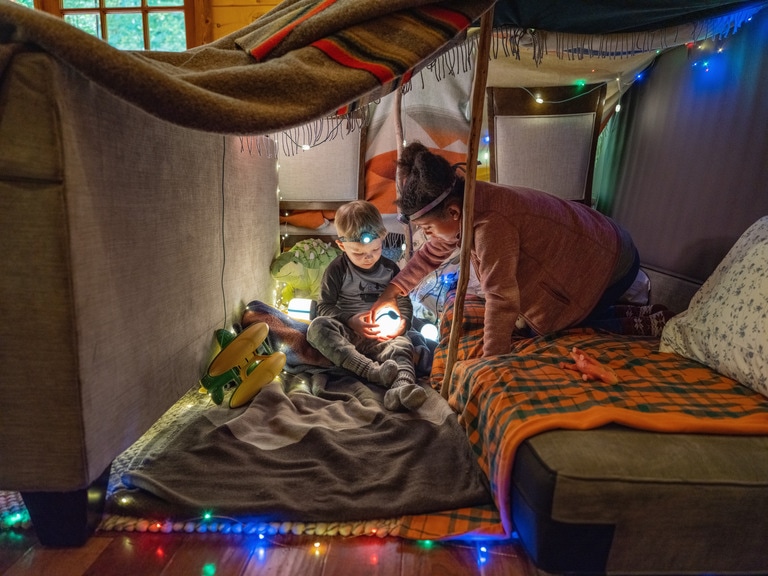
If your kids are outdoor newbies, pitch a tent in the backyard or even inside your home. Let them hang out in it and sleep in it so they become comfortable with a new sleeping environment. Try a family day outing at a close-to-home park. Spend a half day or so at a lakeshore or park and see how your kids react to the experience.
Let Kids Help Pack
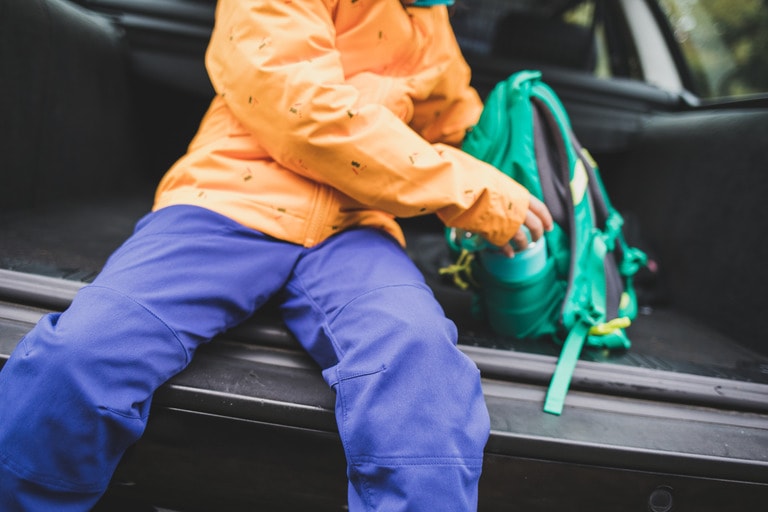
Give children the responsibility to pack their own camping gear (using a list you've created). Double-check your child's packing job before leaving home. Keep organized by having your kids pack personal items in a duffel bag and encouraging them to always return those items to that duffel. Each child's duffel should be a different color for easy identification. Here's a camping checklist to help you get started (you don't have to bring everything on the list).
Pack Food Kids Like
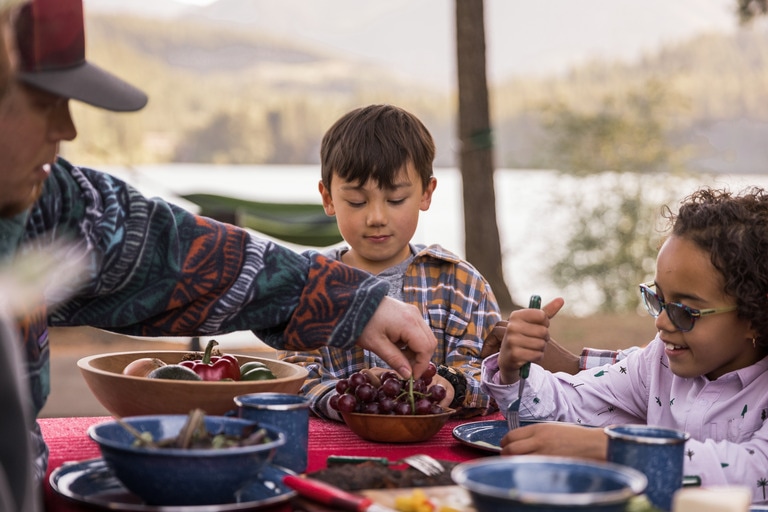
Allow your kids to help contribute to menu planning so they get excited about the trip. Ask them what they would like to eat and what treats they want. Pack foods you know they'll like; now may not be the time to try out a new culinary meal. Keep ready-to-go snacks that are accessible while you're traveling and at the campsite.
Try this French toast camp recipe that's certain to please the kiddos. Search our archives for camping recipes.
Find the Right Campsite
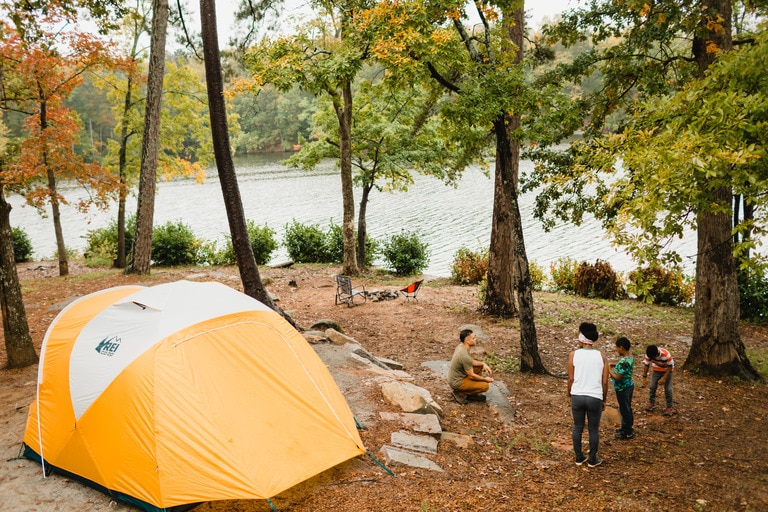
Pick campgrounds with amenities that suit your family's needs. Some campgrounds have ballfields, beaches or swimming areas, streams or rivers and playgrounds; others offer picnic tables, flushing toilets and hot showers. If it's your first time out, start small, stick close to home and choose more developed campgrounds with buckets of amenities. Work your way up to more remote or adventurous locations or longer trips. Ask other families for their favorite kid-friendly recommendations. Make trip planning a family affair. Ask kids for ideas of things to do or see at your destination. Take their input seriously.
You can search for public lands campgrounds using Recreation.gov, which lets you filter by amenities or activities like berry picking or fishing. Hipcamp is a great resource for finding private lands campsites nationwide (and worldwide). For a detailed explanation about different types of camping, read Where Can I Camp?
Research Activities
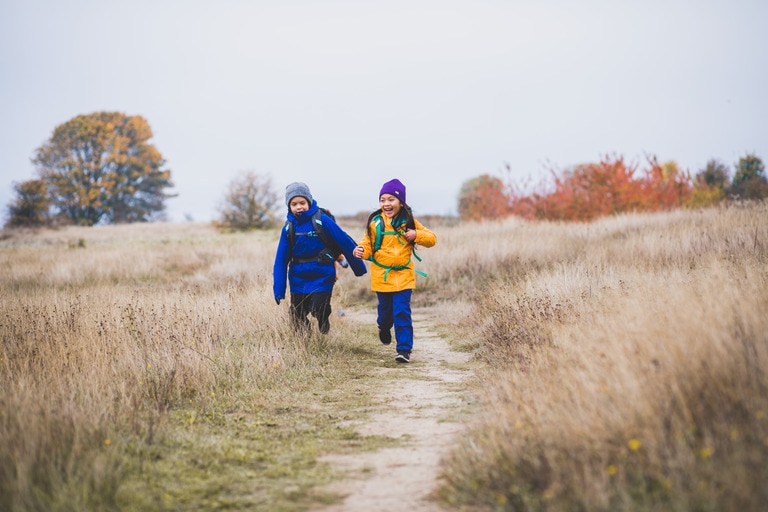
Know what day hikes or other activities are available at your destination. Be ready with some potential ideas when the kids say: "I'm bored." More developed campgrounds have bulletin boards that map out easy nature trails. Can you rent a boat or is there room to ride bikes? Plan ahead for hikes and read tips on family hiking.
Here are just a few great kid-friendly hikes in national parks.
Organize Your Gear
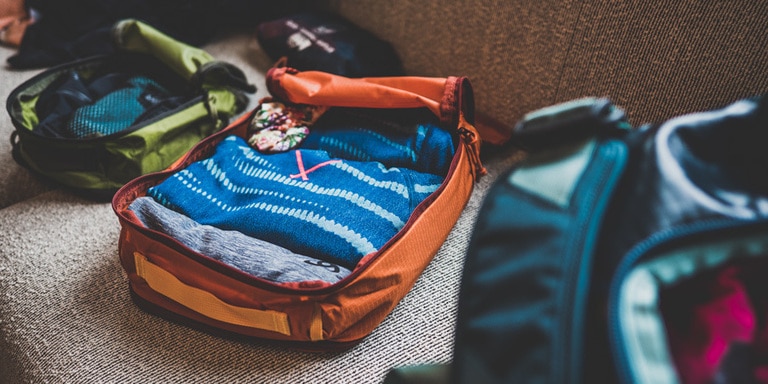
Organize camping gear in totes for easy access when you get to camp. Use clear plastic bins or cardboard boxes to keep your kitchen supplies, tent, sleeping bags and other equipment in separate compartments. Anything that's kitchen related goes into one bin, box or bag; sleeping gear in another. You don't want to spend a lot of time rummaging through your stuff at camp, particularly if you roll into a campsite later than expected. Having items organized ahead of time also keeps you organized for the next trip.
Use a camping checklist to make sure you don't forget the important stuff.
Dress Your Kids in Layers
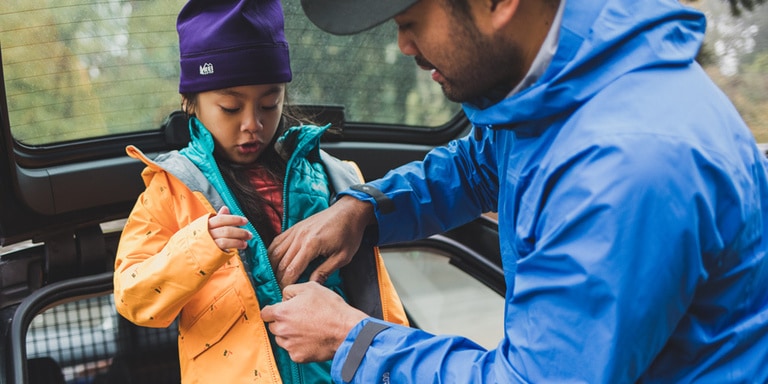
Check the weather and dress your kids for those outdoor conditions. If there's a chance of rain, be prepared with rain jackets (and one or two activities for the tent!). Temperatures can drop at night even if it's hot and sunny during the day. Think layers so kids can put on or take off clothing as needed to adjust to temperature changes. Babies and infants don't move around as much as older kids so they generally need one more layer than what you would wear. Read more clothing tips in our article on how to dress kids for the outdoors.
Anticipate Possible Challenges
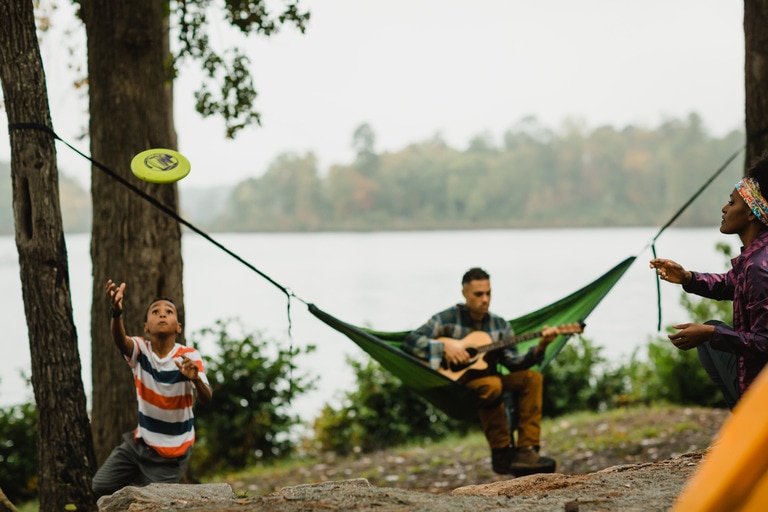
You know your child best and how they may respond to situations. Try to troubleshoot potential problems ahead of time. Is your child still potty-training or hates getting up at night to go to the bathroom? Bring a little travel toilet that you could put just outside your tent. Does your child wake up early? Bring a book or a toy that could keep them occupied in the morning when you're still bleary-eyed. Is your teen a light sleeper and a late riser? Remember earplugs so your teen can sleep in while the rest of the family is enjoying an early breakfast.
Pack a Favorite Toy
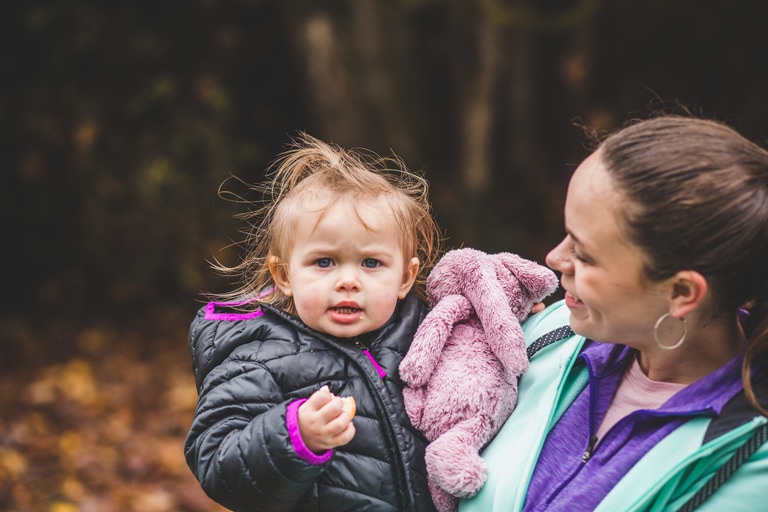
Bring one or two favorite games and toys but try to keep toys to a minimum. Leave room for lots of unstructured outdoor play. Children often find far more interesting things to see and play with at the campground. You may be surprised at how many hours your child will spend digging in sand or simply exploring. Children will find ways to create their own outdoor amusement. If you do bring toys, let it be something that will complement their outdoor play such as a kite, a ball, flying disc, magnifying glass to spy insects or binoculars.
Add Special Touches
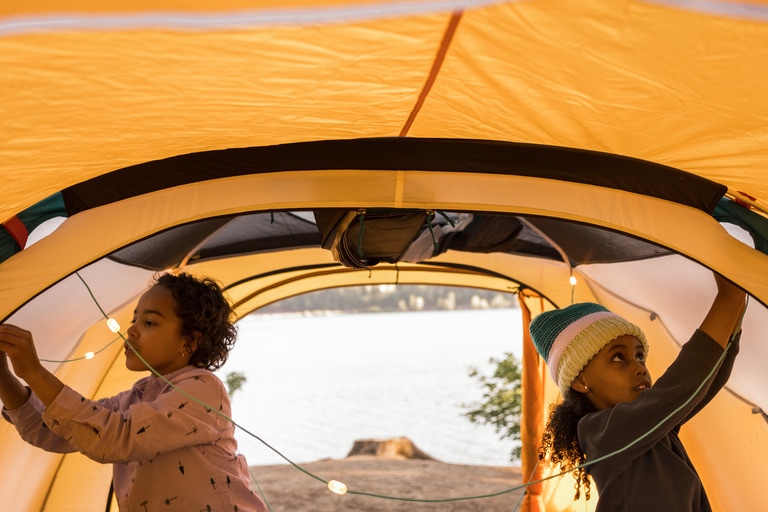
You don't need to go out and buy a lot of gear, but one or two special items can really add to kids' camping enjoyment. Consider packing glowsticks, kid-size camp chairs or other kids' camping gear. Give kids their own flashlight, headlamp or other camp lighting. Kids may enjoy having a string of solar- or battery-powered lights for inside the tent at night.
Involve Your Kids

Even if it feels like you can pitch your tent or cook a meal faster by yourself, involve your kids in camp chores as much as possible. Teach them the basics: how to set up a tent, find a level tent site or cook a camp meal. Assign kids age-appropriate, meaningful tasks. Younger kids can help fill up water bottles, roll out sleeping bags or pump up sleeping pads. Put older kids in charge of washing dishes or cooking one night's dinner. Read more tips on how to set up a comfortable campsite.
Have a Positive Attitude
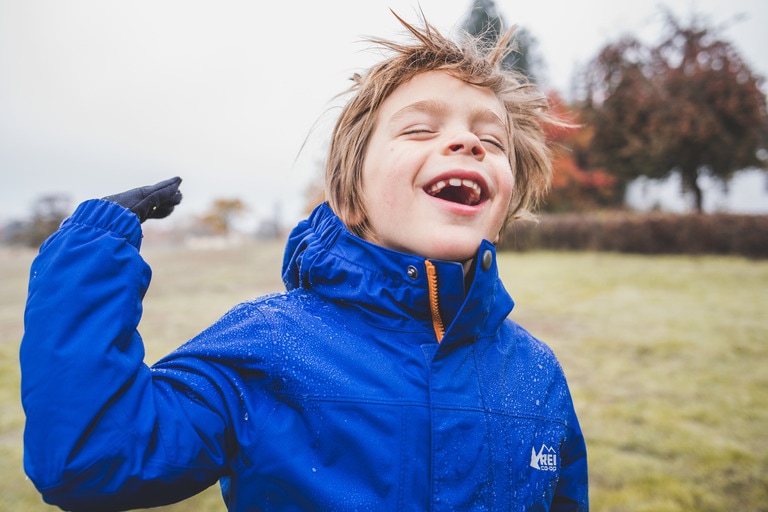
Be enthusiastic. Why should kids get excited about a family camping trip if you're not? The first rule of camping with kids? Be prepared to cope with inconvenience. Everything is in a different place. The bathroom is no longer down the hall; running water may or may not be available. Lead by example with an upbeat, can-do attitude and your kids will pick up on your vibe.
Think Safety
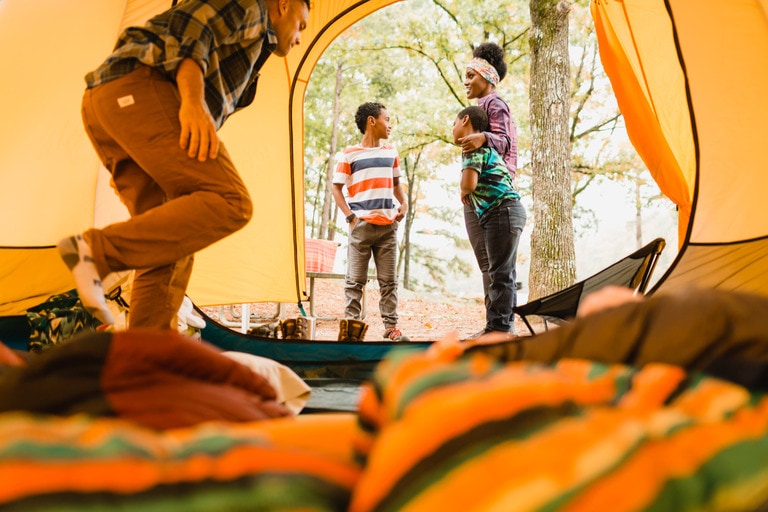
Once you get to a campsite, set ground rules for where your children can roam and talk about what they should do if they get lost. What are the boundaries? Are they allowed beyond the parking lot or near water? Are they allowed to wander into other people's campsites or to go to the bathroom by themselves? Give kids a whistle and teach them to blow it if they become separated from you. At night, make sure they have access to a flashlight or headlamp. Be aware of certain features at the campground that could be hazardous—a nearby road, a fast-moving stream, a steep bluff.
Find Teaching Moments
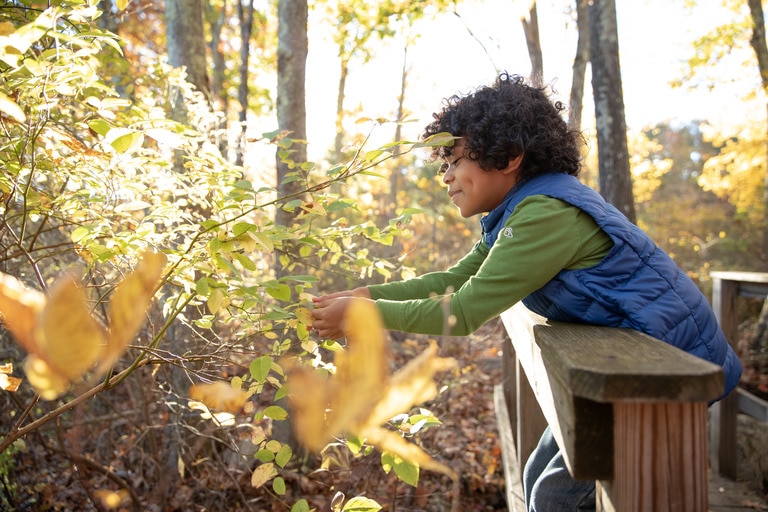
No matter what age, your children are never too early to learn about best practices to follow when they're outdoors. Remind them how they can enjoy the environment while also taking small steps to protect it. Teach them how to respect wildlife (don't feed the animals or squash the bugs), dispose of trash properly (pack it in, pack it out), leave rocks, plants and other things where they find it and other "leave no trace" principles. If you're camping in unimproved areas, make sure you and your kids follow proper practices for going to the bathroom in the woods.
Make the Most of Nature
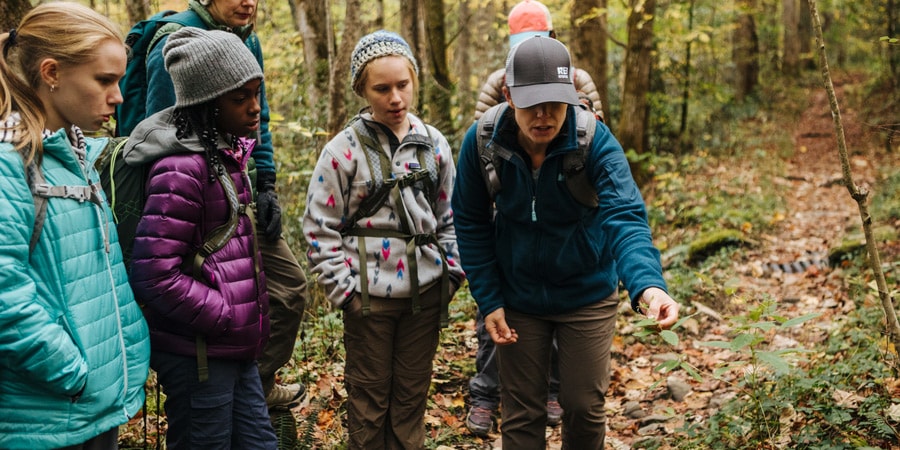
Look for wildlife. Check out bugs. Examine rocks. Identify birds, flowers, clouds, constellations. Lead kids on a rock scramble. Show interest in things that interest them. Bring a field guide or nature viewing guidebooks to help identify plants or animals and learn about the things they find. Take advantage of nature programs or ranger talks. Many national parks offer junior ranger programs, guided nature hikes or night sky activities. Ask campground staff if the park offers kid-focused activities.
Embrace Dirt
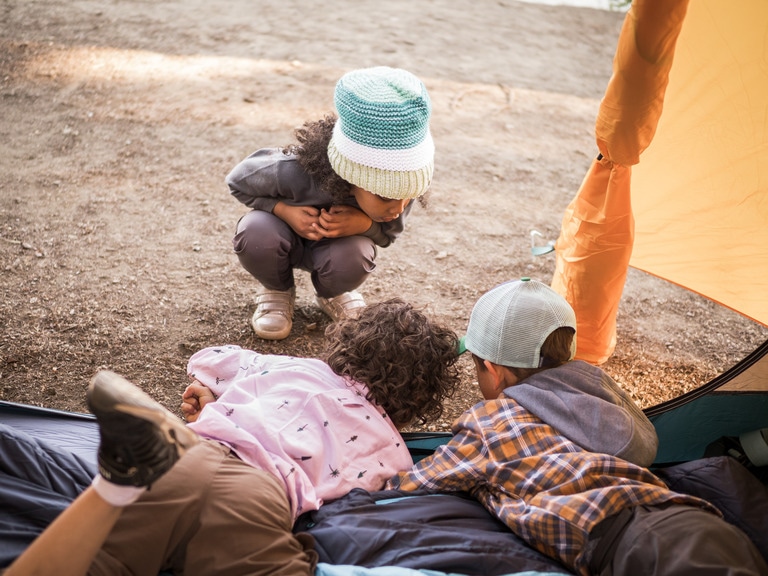
Let's face it. Kids will get dirty while camping. They'll get mud on their shoes, bits of s'mores in their hair and dust everywhere. Camping is the one place where they should have room to get messy. If there's no running water at your site, consider setting up a hand-washing station with a small bucket of soapy water. Bring a little camp rug to set outside your door if you want to keep the inside of your tent tidier.
Pitch an Extra Tent (for Teens)
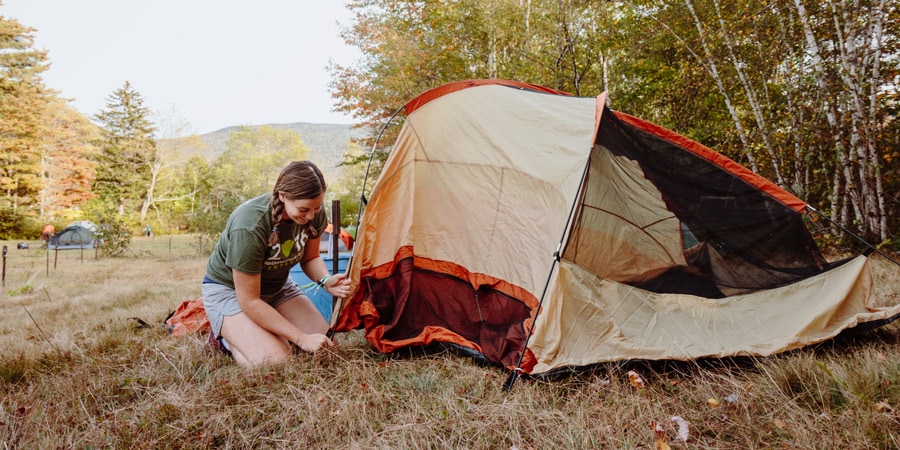
It's not always possible or practical but consider bringing two small tents or a larger tent with a separate screened "room" for your privacy-craving teenager. Having a separate sleeping area gives older kids a little independence and some control over their domain. Let them bring along a friend or camp with another family with older kids.
Cut Your Teens Some Slack
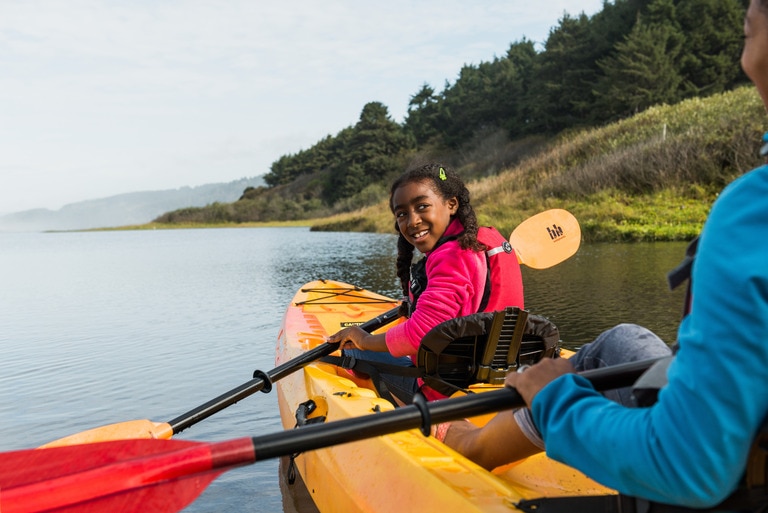
Many tweens and teens may be self-conscious about their bodies, so "roughing it" can be hard if they're unhappy about acne, body odor or dirty clothes. Give your teens some slack if they insist on packing hair, skin or other products that you might deem unnecessary for camping. Let them sleep in, wander off on their own (set guidelines) or bring a friend along. Many teens are also glued to their smartphones or other electronic devices; while you may not be able to get them to go cold turkey, consider setting some reasonable limits or expectations.
Be Flexible
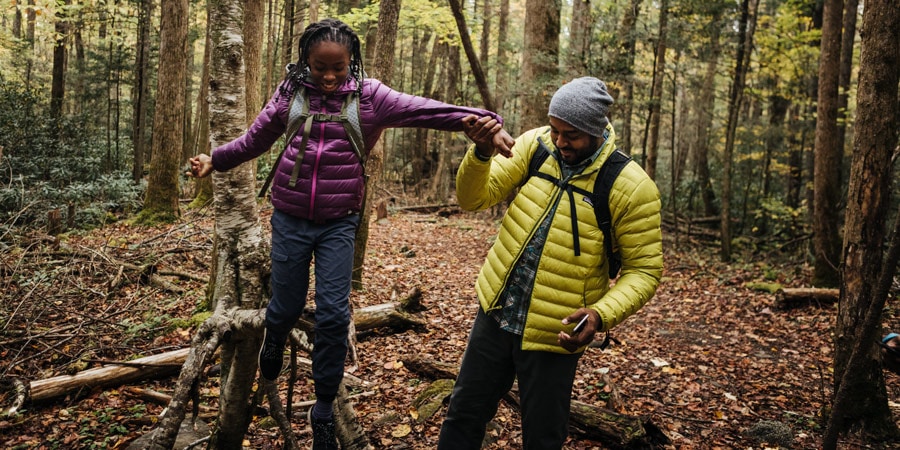
No matter how prepared you are, things may not go the way you planned. Remember that all you can do is create a good structure for your kids to camp. The best part of going outside is that you create experiences as you go. Be flexible and patient. Slow down. Let go of strict schedules and enjoy the moment. Don't force your kids on a day hike if that means everyone in the family will be upset.
Create a Cozy Sleep Environment
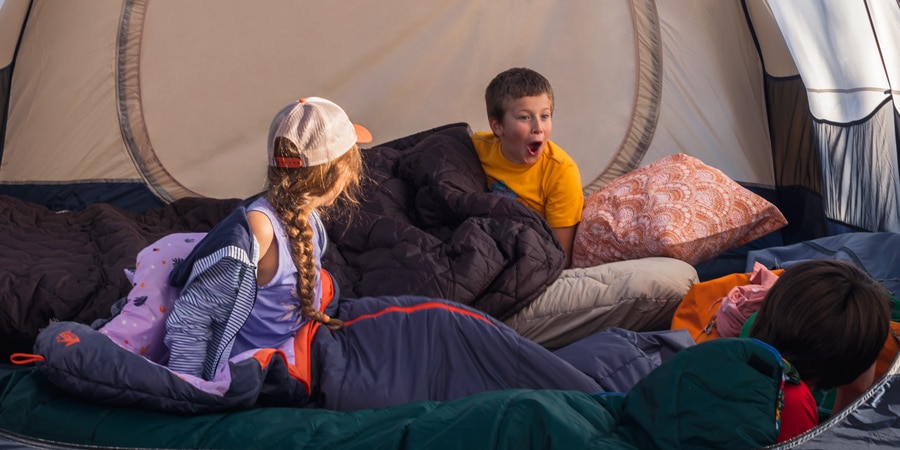
Younger kids may want their pillow, favorite blanket or a stuffed animal. Don't skimp on the things that are most important to you. If you have trouble falling asleep, opt for a thicker more luxurious camp pad. Bring pillows from home or your favorite blanket. For babies, use a play yard or portable crib if you have a tent that's big enough for it. The more you camp, the more you'll learn what you need and what you can live without. Read more sleeping tips for campers.
Stick to a Familiar Bedtime Routine
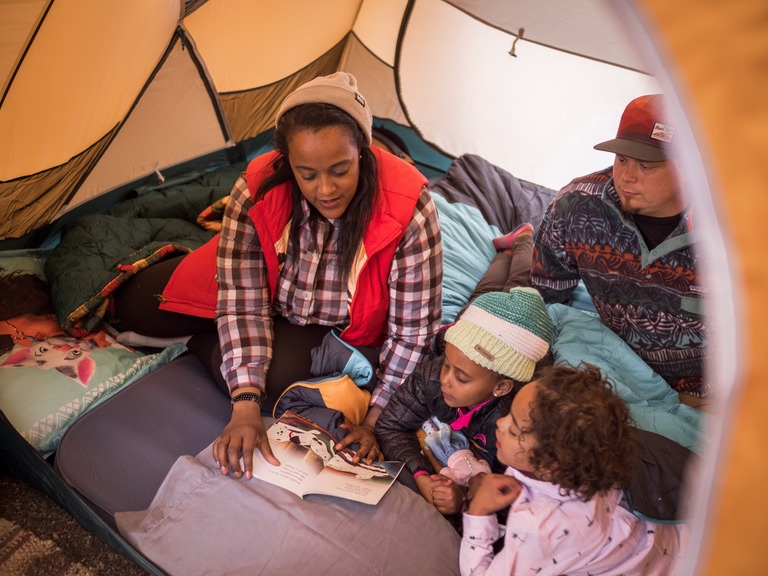
If you read a few books with your child before bed each night, don't skip it just because you're camping. Young kids love routine. Put them in sleeping pajamas, brush teeth and read a few books. For babies, keep their sleeping habits as close to routine as possible (e.g., bring a portable white noise machine if you use one at home). Read more tips on how to camp with a baby.
Allow Room to Grow
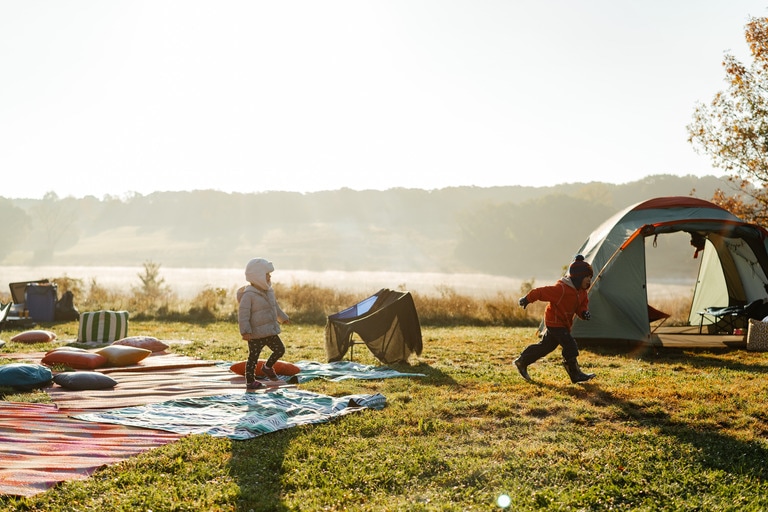
You're not going to create the perfect experience the first or even second time out. Take notes at the end of each trip to remind yourself what you should bring next time, what you can leave behind or how you might do things differently.

